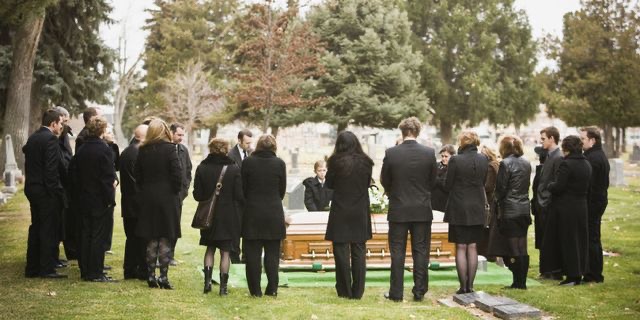
The Death of the Funeral

I’m in mourning. And it’s not the recent loss of ladies such as Jenny and Mary Ann.
I’m mourning the loss of the funeral. Scan local obituaries and you’ll see more and more notices ending with the news that, often in keeping with the wishes of the deceased, cremation has taken place and there will be no funeral.
Why the trend? Cost, for starters. Yes a traditional funeral can be pricey especially if there is a casket, a venue for the ceremony, a plot, incidentals and a lunch afterwards. It adds up.
Also, our tribes have scattered. Families and friends move far away and would have a hard time criss crossing the globe to attend a funeral.
Some don’t want a fuss made over them.
And religion is losing it’s impact. There was a time when cremation was frowned upon. Today, practicing Catholics are allowed to choose cremation; however, the church still wants a ceremony and for ashes to be buried, not scattered. And there was a time when it was just accepted that death would be followed by a church service of some description whether or not the deceased ever warmed a pew.
So formal rituals and burials are on the way out. But after more than three decades officiating at funerals, I wonder if in our attempt to be frugal and convenient, we are giving up a ritual which is as old as our species. Burying and mourning our dead.
Rituals at the time of a death are not fun. Cremation is cheaper than burying a body, but if we scatter the ashes to the elements, we have given up a physical location to return to in order to focus our grief.
Church funerals can be costly and somewhat hypocritical for those who are not religious. But with the help of an officiant, a secular ceremony can be just as rich and rewarding. There are deep wells of poetry, proverbs and wisdom which can aid and console us. An officiant, someone who stands outside the circle of family and friends, can guide and orchestrate our gatherings with readings and eulogies whether at the venue or graveside or both.
Funerals and other ceremonies at a time of death help us process our most profound thoughts and feelings. They make a difference in helping us channel our grief toward healing.
When everyday words and actions are inadequate, the ritual of ceremony provides a needed structure of what to say and do. Funerals also help us acknowledge the reality of the death, remember the life that was lived, support one another in our grief, express our grief outside of ourselves, and begin the long, hard process of coming to transcend our grief toward a wholeness.
Social gatherings and rites of passage ceremonies are vital to our social nature and if we let them die, a bit of our connection as laughing, mourning humans dies too.
Post a comment